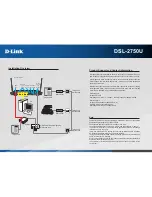
74
250-0800-06, Version A
D I T E C H N E T W O R K S
w w w . d i t e c h n e t w o r k s . c o m
Media Provisioning
Packet Voice Processor Commands Manual
6.5.2 Next-Hop IP Failures - Port State Transition / Traffic Redirection
displays the transition on next-hop IP connection failure
events for a Packet Voice Processor (Static LACP mode). Each box in the figure
represents the provisioning settings for the 4 Gigabit Ethernet interfaces on the 2
Interface Processing cards located in shelf slots 4 and 6. Each port can have either
an active, inactive, or standby state. Each port also has either a master or backup
redundancy role.
The solid lines in this figure represent the redirection flow in the event of an IP
connection failure. The dashed lines in this figure represent state transition only (no
media traffic redirection), in the event of a standby port going up or down. Note that
when a standby port goes up or down, it does not affect the IP connection to the next
hop device.
For example, at location A in this diagram, the 4 Gigabit Ethernet ports are
provisioned as follows:
GigE/4/1 Standby Master
GigE/4/2
Active
Backup
GigE/6/1 Standby Master
GigE/6/2 Inactive Backup
In the event of a next-hop IP connection failure with GigE/4/2 (active port), the traffic
is redirected to GigE/4/1 port. GigE/4/2 port state becomes the standby (follow the
solid line from location A to location B).
The 4 Gigabit Ethernet ports are now provisioned as follows:
GigE/4/1
Active
Master
GigE/4/2 Standby Backup
GigE/6/1
Active
Master
GigE/6/2 Inactive Backup
If there is a subsequent change to the standby port (up or down), the change is
represented with dashed lines. In
, there is a change in port states from
location B to location C (follow the dashed lines). GigE/6/2 changes state from
Inactive to Standby. Note that this state change for the standby port does not affect
the IP connection to the next-hop device.
to determine LAG port state transitions and traffic redirections in the
event of a next-hop IP connection failure.
















































